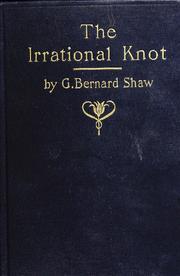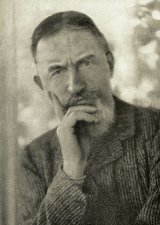The Irrational Knot Page #4
The Irrational Knot was first published in 1905, having been written in 1880. Within a framework of leisure class preoccupations and frivolities Shaw disdains hereditary status and proclaims the nobility of workers. Marriage, as the knot in question, is exemplified by the union of Marian Lind, a lady of the upper class, to Edward Conolly, always a workman but now a magnate, thanks to his invention of an electric motor that makes steam engines obsolete. The marriage soon deteriorates, primarily because Marian fails to rise above the preconceptions and limitations of her social class and is, therefore, unable to share her husband's interests.
- Year:
- 1880
- 1,107 Views
Money is indeed the most important thing in the world; and all sound and successful personal and national morality should have this fact for its basis. Every teacher or twaddler who denies it or suppresses it, is an enemy of life. Money controls morality; and what makes the United States of America look so foolish even in foolish Europe is that they are always in a state of flurried concern and violent interference with morality, whereas they throw their money into the street to be scrambled for, and presently find that their cash reserves are not in their own hands, but in the pockets of a few millionaires who, bewildered by their luck, and unspeakably incapable of making any truly economic use of it, endeavor to "do good" with it by letting themselves be fleeced by philanthropic committee men, building contractors, librarians and professors, in the name of education, science, art and what not; so that sensible people exhale relievedly when the pious millionaire dies, and his heirs, demoralized by being brought up on his outrageous income, begin the socially beneficent work of scattering his fortune through the channels of the trades that flourish by riotous living. This, as I have said, I did not then understand; for I knew money only by the want of it. Ireland is a poor country; and my father was a poor man in a poor country. By this I do not mean that he was hungry and homeless, a hewer of wood and a drawer of water. My friend Mr. James Huneker, a man of gorgeous imagination and incorrigible romanticism, has described me to the American public as a peasant lad who has raised himself, as all American presidents are assumed to have raised themselves, from the humblest departments of manual labor to the loftiest eminence. James flatters me. Had I been born a peasant, I should now be a tramp. My notion of my father's income is even vaguer than his own was--and that is saying a good deal--but he always had an income of at least three figures (four, if you count in dollars instead of pounds); and what made him poor was that he conceived himself as born to a social position which even in Ireland could have been maintained in dignified comfort only on twice or thrice what he had. And he married on that assumption. Fortunately for me, social opportunity is not always to be measured by income. There is an important economic factor, first analyzed by an American economist (General Walker), and called rent of ability. Now this rent, when the ability is of the artistic or political sort, is often paid in kind. For example, a London possessor of such ability may, with barely enough money to maintain a furnished bedroom and a single presentable suit of clothes, see everything worth seeing that a millionaire can see, and know everybody worth knowing that he can know. Long before I reached this point myself, a very trifling accomplishment gave me glimpses of the sort of fashionable life a peasant never sees. Thus I remember one evening during the novel-writing period when nobody would pay a farthing for a stroke of my pen, walking along Sloane Street in that blessed shield of literary shabbiness, evening dress. A man accosted me with an eloquent appeal for help, ending with the assurance that he had not a penny in the world. I replied, with exact truth, "Neither have I." He thanked me civilly, and went away, apparently not in the least surprised, leaving me to ask myself why I did not turn beggar too, since I felt sure that a man who did it as well as he, must be in comfortable circumstances.
Translation
Translate and read this book in other languages:
Select another language:
- - Select -
- 简体中文 (Chinese - Simplified)
- 繁體中文 (Chinese - Traditional)
- Español (Spanish)
- Esperanto (Esperanto)
- 日本語 (Japanese)
- Português (Portuguese)
- Deutsch (German)
- العربية (Arabic)
- Français (French)
- Русский (Russian)
- ಕನ್ನಡ (Kannada)
- 한국어 (Korean)
- עברית (Hebrew)
- Gaeilge (Irish)
- Українська (Ukrainian)
- اردو (Urdu)
- Magyar (Hungarian)
- मानक हिन्दी (Hindi)
- Indonesia (Indonesian)
- Italiano (Italian)
- தமிழ் (Tamil)
- Türkçe (Turkish)
- తెలుగు (Telugu)
- ภาษาไทย (Thai)
- Tiếng Việt (Vietnamese)
- Čeština (Czech)
- Polski (Polish)
- Bahasa Indonesia (Indonesian)
- Românește (Romanian)
- Nederlands (Dutch)
- Ελληνικά (Greek)
- Latinum (Latin)
- Svenska (Swedish)
- Dansk (Danish)
- Suomi (Finnish)
- فارسی (Persian)
- ייִדיש (Yiddish)
- հայերեն (Armenian)
- Norsk (Norwegian)
- English (English)
Citation
Use the citation below to add this book to your bibliography:
Style:MLAChicagoAPA
"The Irrational Knot Books." Literature.com. STANDS4 LLC, 2024. Web. 19 May 2024. <https://www.literature.com/book/the_irrational_knot_7>.




Discuss this The Irrational Knot book with the community:
Report Comment
We're doing our best to make sure our content is useful, accurate and safe.
If by any chance you spot an inappropriate comment while navigating through our website please use this form to let us know, and we'll take care of it shortly.
Attachment
You need to be logged in to favorite.
Log In